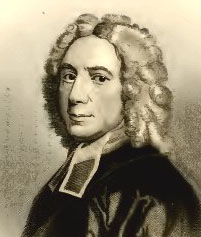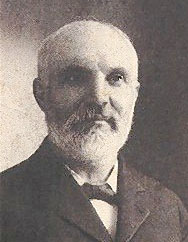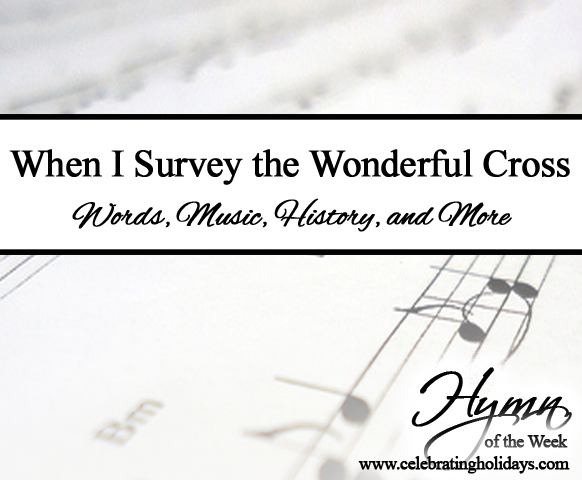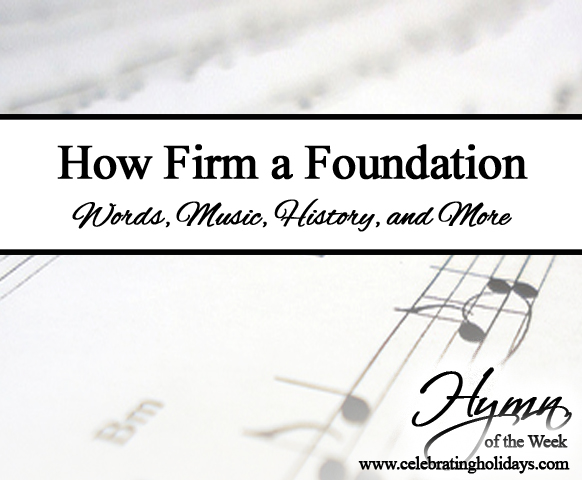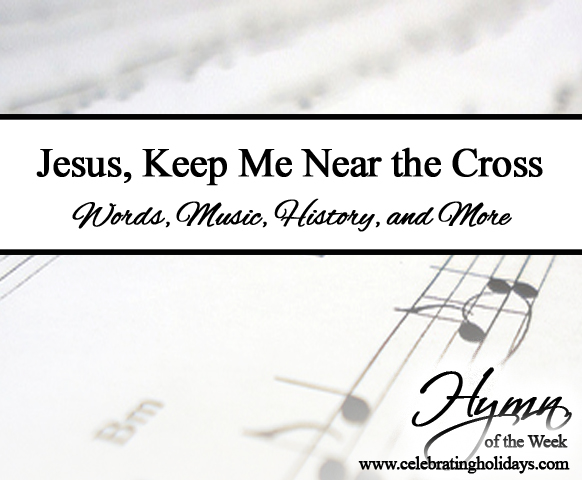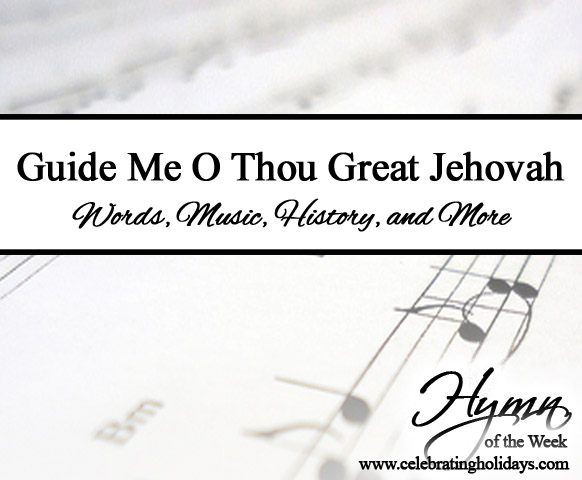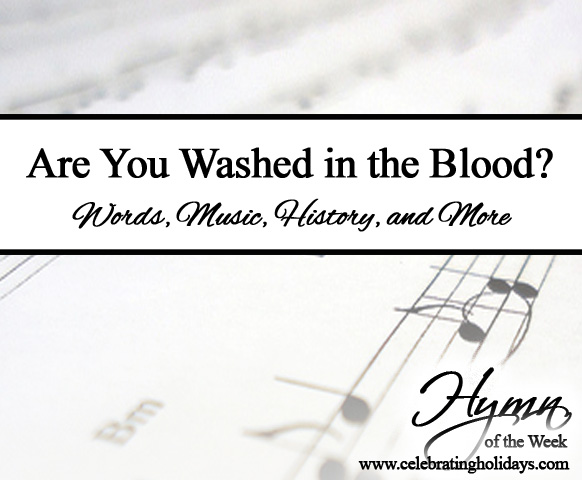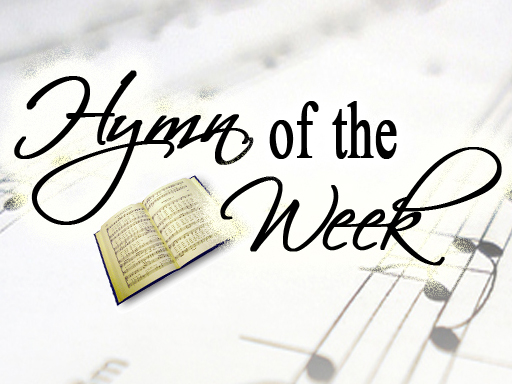Alas! And Did My Savior Bleed?
This page includes a lyric video, history, sheet music, and other resources for the classic hymn “Alas! And Did My Savior Bleed? (At the Cross).” Enjoy!
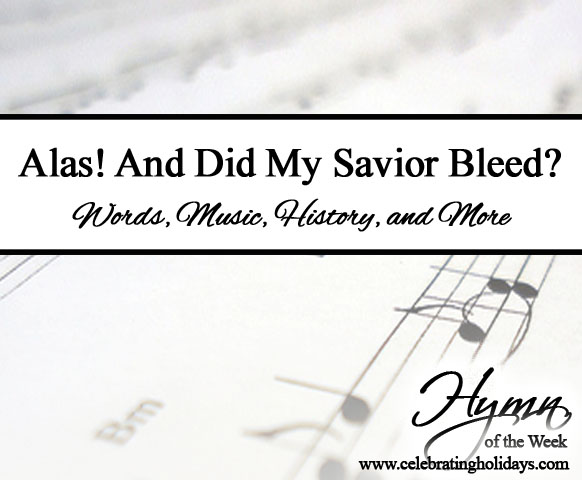
Enjoy this You Tube video, performed by Hymn Charts, with lyrics for “Alas! And Did My Savior Bleed? (At the Cross).”
History of “Alas! And Did My Savior Bleed? (At the Cross)”
Words by Isaac Watts (1674-1748), Published in 1707
Isaac Watts was the oldest of nine children born in England to a father, also named Isaac, who was imprisoned on more than one occasion for dissenting from the doctrine of the Anglican Church. It is said that Isaac’s mother Sarah used to nurse him while sitting on a stone outside the prison and talking with her husband through the bars.1
Watts showed exceptional intellectual ability in his youth. By age 13, he had learned Latin, Greek, French and Hebrew. He also demonstrated his wit with rhyme at a young age. Once when asked to explain why he was disturbing the evening prayers, Watts described the mouse that was distracting him: “A mouse for want of better stairs, ran up a rope to say his prayers.”2 On this occasion (or possibly another), when he was being punished for his irritating rhymes, he said, “O father, do some pity take, and I will no more verses make.”3
If Watts had been a member of the Church of England, he probably would have been sent to Oxford or Cambridge for college. Instead, he was enrolled at a school for “dissenters” in London. After leaving the Dissenting Academy at 19, Watts returned to his father’s parish, Above Bar Congregational Church, in Southampton.
Both Watts and his father found church music to be uninspiring and monotonous. The congregational singing in English-speaking churches was limited to metrical psalms. Many Christians believed that it would be offensive to God to sing anything other than the actual words of Scripture. It was Watts’ father who first challenged him to “write something better for us to sing.”4
After Watts presented his first song, the congregation at his father’s church responded with tremendous enthusiasm . . . so much so that they requested a new hymn every week. The next two years would become the richest hymn-writing period in Watts’ life. After these two years, Watts moved to London to work as a tutor.
In London, Watts joined the Mark Lane Independent Church. On his 24thbirthday in 1698, he preached his first sermon, and by 1702, he became the senior pastor. He retained this position for the remainder of his life and would become one of the best-known preachers in England.
Interestingly, Watts was also a reputable author of educational books on geography, astronomy, grammar and philosophy.5 His books were widely used in universities in the 18thcentury. However, Watts is now best known for his hymns, which were motivated by a “fervent concern about the dismal state of congregational singing.”6 He wrote, “While we sing the Praises of our God in his Church, we are employ’d in that part of worship which of all others is the nearest a-kin to Heaven; and ‘tis pity that this of all others should be perform’d the worst upon Earth.”7
Watts published a number of collections of songs and hymns. In 1707, “Alas! And Did My Savior Bleed” appeared in his Hymns and Spiritual Songs. Though the song was well-known in Great Britain, it became even more popular in America.8 Interestingly, Fanny Crosby, the famous American hymn writer, recounted that the song was instrumental in her conversion. While singing this song during a revival meeting in 1850, Fanny said that her “very soul was flooded with a celestial light.”9
Though Watts’ hymns rapidly spread across England and America, their popularity did not come without controversy. They were derogatorily referred to as “Watts’ Whims” or “songs of human composure.” One man complained, “Christian congregations shut out divinely inspired Psalms and take in Watts’ flights of fancy as if words of a poet were better than those of a prophet.”10
Fortunately, Watts’ hymns survived the controversies, and he rightly earned the title “father of English hymnody.” Many of Watts’ more than 600 hymns can still be heard in churches across the world; some of the most notable are: “Joy to the World,” “O God, Our Help in Ages Past,” “We’re Marching to Zion,” and “When I Survey the Wondrous Cross.”
Words “Hudson” by Ralph Erskine Hudson (1843-1901), Published in 1885
Watts wrote his hymns as poems, and they were sung to a variety of tunes. Originally, the most popular tune for “Alas! And Did My Savior Bleed?” was an old Scottish melody. However, in 1885 Ralph Hudson, a preacher, singer, and song writer published the song with a tune (now named “Hudson”) in his collection titled Songs of Peace, Love, and Joy. He also added the now popular refrain “At the Cross” to the song. Though Ralph is credited with composing the refrain melody, hymnologist Donald Hustad records that the tune for the refrain “appears with other words and is also credited to other individuals in late 19th century publications. . . . It is a possibility that both words and melody of the refrain were commonly known and used in the campmeeting tradition, and that Hudson simply added them to his own original melody.”11
Ralph was indeed active in “campmeetings” (evangelist outreaches) for a good part of his life. He was born in Ohio in 1843. When he was still a teenager, the American Civil War broke out, and Ralph enlisted in the Union Army to serve as a nurse at the General Hospital in Annapolis, Maryland. After discharge, he pursued his interest in music and taught at Mount Vernon College in Ohio. However, after five years, he left his teaching post to engage in his other passion — preaching. He was active in evangelistic outreaches and offered his services in a variety of ways (whether it be preaching, singing, or even writing music). Eventually, he established his own publishing company through which he produced several collections of songs – often setting “standard hymns to gospel song tunes, sometimes adding a refrain of his own.”12 Ralph traveled extensively doing both evangelistic work and introducing his song collections – a wonderful gift to the churches of his time – right up until his death in 1901.
Lyrics for “O the Deep, Deep Love of Jesus”:
Alas! and did my Savior bleed
And did my Sovereign die?
Would He devote that sacred head
For sinners such as I?
[originally, For such a worm as I?]
Refrain
At the cross, at the cross where I first saw the light,
And the burden of my heart rolled away,
It was there by faith I received my sight,
And now I am happy all the day!
Thy body slain, sweet Jesus, Thine—
And bathed in its own blood—
While the firm mark of wrath divine,
His Soul in anguish stood.
Was it for crimes that I had done
He groaned upon the tree?
Amazing pity! grace unknown!
And love beyond degree!
Well might the sun in darkness hide
And shut his glories in,
When Christ, the mighty Maker died,
For man the creature’s sin.
Thus might I hide my blushing face
While His dear cross appears,
Dissolve my heart in thankfulness,
And melt my eyes to tears.
But drops of grief can ne’er repay
The debt of love I owe:
Here, Lord, I give my self away
’Tis all that I can do.
Additional Resources for “O the Deep, Deep Love of Jesus”:
Sheet Music (PDF Compliments of Hymnary.org)
Guitar Chords (Links to Ultimate Guitar)
Visit Hymnary.org or Hymn Time.com for more on this hymn.
See our Hymn of the Week page for a list of the hymns that are included on this site.
This page was created by:

We welcome your ideas! If you have suggestions on how to improve this page, please contact us.
You may freely use this content if you cite the source and/or link back to this page.
Sources:
1 Fountain, David Guy. Isaac Watts Remembered. Gospel Standard Publications, 1978, p. 7.
2 Ibid, p. 13.
3 Bailey, Albert Edward. The Gospel in Hymns: Backgrounds and Interpretations. Scribner, 1950, p. 46.
4 Osbeck, Kenneth W. Amazing Grace. Kregel Publications, 1990, p. 12.
5 Encyclopedia Britannica. “Isaac Watts.” Retrieved August 23, 2008 from Encyclopedia Britannica Online: http://www.britannica.com/EBchecked/topic/637744/Isaac-Watts.
6 Osbeck, Kenneth, p. 333.
7 Music, David. Hymnology, A Collection of Source Readings. From Watts’ Preface to Hymns and Spiritual Songs, 1707. The Scarecrow Press, 1996, p.115).
8 Julian, John, editor. Dictionary of Hymnology. Kregel Publications, 1985 (republished 1907 edition), p. 34.
9 Crosby, Fanny. Memories of Eighty Years. James H. Earle & Company, 1906, p. 24.
10 Abbey, John Charles. Religious Thought in Old English Verse. Sampson Low, 1892, p. 344.
11 Hustad, Donald P. Dictionary Handbook to Hymns for the Living Church. Hope Publishing Company, 1978, p. 103.
12. Ibid, p. 261.
